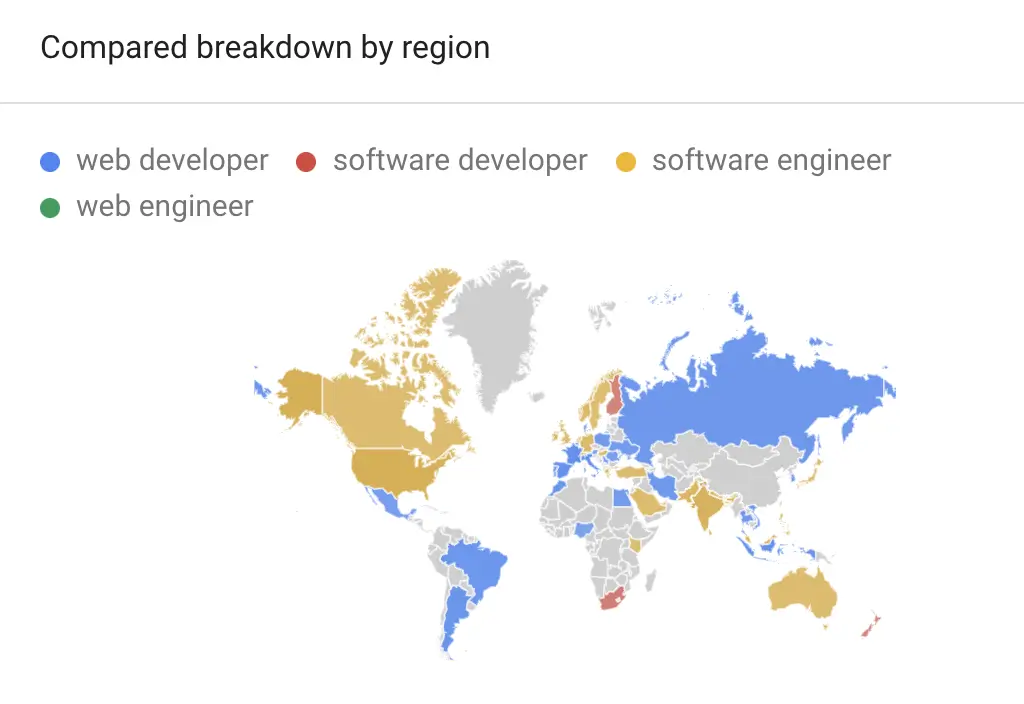If you’re thinking about making the jump and learning to code and want to see what’s out there, things can get very confusing—fast.
First things first, what is a programmer’s actual job title? Web developer, software engineer, software developer…web engineer?
Fear not—help is at hand.
What’s in a name? The difference between software engineering and web development can be relatively simple.
Where software developers might focus more on designing programs for computers (for example your antivirus software like Avast or McAfee), web developers concentrate more on building applications and websites for the web.
Want to see if either of these is for you? Try this free 5-day coding course to get a feel for it.
We’ll take a look at software engineering and web development and what they involve, as well as explain the terms software developer and web engineer, so that you can be clear on them. If there’s a certain section that you’d like to read first, just use the clickable menu:
- Software engineer or web developer—which term should I use?
- What does a software engineer do?
- What does a web developer do?
- Wait, so what does a software developer do?
- …and what about web engineering?
- Software engineering versus web development
- What you would learn in a typical coding program
- Deciding which is right for you
- Final thoughts
1. Software engineer or web developer—which term should I use?
Some reckon the difference between a software engineer and a web developer is more a matter of location, location, location.
In the US it’s more common for the term “software engineer” or “software developer” to be used, but that can change as well depending on the state. Taken over the past five years, Google searches for “software engineer” are far more popular than the other three, with “web developer” and “software developer” battling it out in second. The much more niche term “web engineer” is well in last place, but we’ll explain it more later.
The divide between the two terms can vary again if you look at the trends globally, with a transatlantic divide definitely at work:

Outside of North America, web developers are generally more likely to be searched for lately.
All-in-all, now that you see that different terms can appear depending on where you are and which company is mentioned, it’s time to explore each of these job titles to get familiar with the potential differences (and similarities) between them.
2. What does a software engineer do?
Software engineers typically work designing, testing, and building programs for hardware, operating systems, and networks. They are inclined to work much closer to the hardware than web developers.
The scope of their work, however, can extend to creating not just desktop programs (example: the Netflix app on your Windows PC), but mobile (the Netflix app on your iPhone) and web apps (running Netflix in your Google Chrome browser) as well.
Typical software engineering languages could include C++, Java, and Python. Again, many of these are going to be popular with web developers as well, due to their broad functionality and applicability.
The following are examples of sample responsibilities of a software engineer. Bear in mind that these are only to give you a sense of what to expect—the realities of the role can differ depending on the team, company, and industry you’d be working in.
Software engineer responsibilities:
- Building and testing applications for user needs
- Analyzing, diagnosing, and adjusting existing software
- Monitoring overall system performance
- Designing backend architecture
- Identifying new technologies which may improve the existing software
If you’d like to take a deeper dive, check out our full guide to what a software engineer does.
3. What does a web developer do?
Originally, as the name suggests, a web developer is typically working more with websites, web apps, and APIs.
However, it has to be acknowledged that the lines are quite blurred between web developers and software engineers, particularly when you compare jobs ads for the two. Depending on whether you’re a frontend or a backend developer, you can find yourself doing quite similar tasks as well as approaches to projects.
In terms of languages, similar to software engineering, these depend on what you are looking to do.
While a frontend web developer would be working typically in HTML, CSS, and JavaScript, they are far from limited in which language they use. Backend web developers could be working more in Python, Java, and C, as they can be used more for working with databases and memory manipulation.
Web developer responsibilities:
- Designing, planning, and test new web apps and new site features
- Collaborating with UX/UI designers and product managers on planning a website or app redesign (particular frontend developers would be doing this)
- Diagnosing and troubleshooting website issues such as page load speed
- Monitor website traffic and overall systems health
- Staying up-to-date on the latest releases and tools
If you’d like to learn more about what they do, coder and CareerFoundry mentor Cyrille tells you more about his life in this beginner’s guide to what a web developer does.
4. Wait, so what does a software developer do?
This is where things get slightly more tricky. To keep things simple, the difference between a software engineer and a software developer can be that of scope.
Software developers are able to design a system based on the needs of the customers. Software engineers, on the other hand, approach the issue from a step back. They typically work with other engineers to design a system that will be able to be used for a variety of customer groups or organizations.
Engineers work with the whole project process from start to finish, whereas developers tend to focus only on one section of it. As a result of this, software engineers are more likely to work with a whole team than a software developer.
Web and software development is an excellent field to get into, with the US Bureau of Labor Statistics predicting a 22% growth in the field between 2020-2030, way above average.
5. …and what about web engineering?
Thought we were finished, didn’t you? Not quite. Web engineering is a type of approach to development itself.
Think of it in a broader sense: It combines theory, research, and practical approaches for applying to web and application development.
Overall far more theoretical than the other two we’ve dealt with so far, it’s much less hands-on. So, if you’re more interested in a more multi-disciplinary, methodological way of approaching the web and technology, web engineering could be a path to look into.
6. Software engineering versus web development
Essentially, the biggest difference between software engineers and web developers isn’t their training, or the programming languages they know, but the work they carry out.
As a result, many consider the two labels almost interchangeable. The type of developer you are depends on your own direction of work—whether you’re a frontend web developer, an iOS app developer. Both titles can involve those who work more with machine learning or in the database side of tech.
On first look, attempting to differentiate the two titles by paycheck could work. According to our research on Glassdoor and Indeed, the title “Software Engineer” earns an average of 100,097 dollars in the United States. “Web Developer” earns a lower average base salary of 66,578 dollars.
However, it’s important to note that as we’ve outlined, these positions are too general to give you some real insight into what you can expect to earn in your career in coding.
For that, we recommend that you look closer at the roles themselves. We’ve dug into the stats a bit more and created guides for each:
- Web developer salary guide
- Software engineer salary guide
- JavaScript developer salary guide
- Full-stack developer salary guide
Now that we’ve got a sense of the different terms and how they are more similar than anything, let’s examine what you would cover when learning them.
7. What you would learn in a typical coding program
If you’re interested in taking your programming career to the next level by enrolling in a program or a coding bootcamp, it’s likely you’ll come across both titles. So which do you choose—a software engineering bootcamp or a web development program?
As we’ve seen already in this article, the differences can be completely in words alone. What’s more worthwhile is taking a closer look at the components of the course curriculum.
A good full-stack coding bootcamp should include (for starters):
- An introduction to web fundamentals
- Version control systems such as Git
- Getting started with Frontend Development, with programming languages such as HTML, CSS, and JavaScript
- Libraries such as React—learn more about this in our beginner’s guide to React.js
- Basics of Backend Development, with languages such as Python and its Django framework, or JavaScript’s Node.js technology
8. Deciding which is right for you
It’s no surprise that software engineering and web development programs and bootcamps share a pretty similar curriculum.
In general, in-person as well as online coding schools share the same aim—to train you in the building blocks of coding and getting you up and running as a qualified programmer.
Because of this, be sure to look for a coding bootcamp that will provide proper mentoring and a dedicated job preparation course. If you’re looking for more tips on how to pick the right one for you, we’ve created a guide on how to choose the right web development bootcamp.
Decoding job ads
As you’ve seen, the reality of the tech scene currently is that job postings can bounce between the title “software engineer” and “web developer.” Frustratingly, they can appear interchangeably depending on location, company, and even hiring manager.
Our key advice is not to panic if you’ve come from a program or bootcamp with the other label. It doesn’t necessarily matter what the label of your program of education is—it’s the skills, tools, and understanding of programming that they are looking for.
Because of this, it’s important that you examine each job posting thoroughly. Which languages, technologies, and frameworks are the company asking you to know, and to what extent? What is the scope of the role—will you be working mostly alone or in a team, will you be monitoring diagnostics and fixing bugs, or will you be overseeing a whole team or project? Once you’ve got a sense of these, then you can decide whether or not to apply.
If you’re still nervous about whether any of the roles are meant for you, it can really help to imagine yourself in the actual role. Because of this, we asked one of our resident in-house coders to go through a day in the life of a web developer.
9. Final thoughts
When Shakespeare’s Juliet asked, “What’s in a name?”, she probably wasn’t referring to the difference between software engineering and web development. But there’s no way for us to know that that wasn’t what she was talking about. Right?
The moral of the story is, don’t worry if you are still a little bit confused about the difference between a software engineer and a web developer. Sometimes the difference can be in the scope at which you would be working, but as we’ve seen, the lines are incredibly blurred. However, as we’ve seen, that shouldn’t be a problem.
Whether it’s about deciding between bootcamps or between jobs at companies, what matters are the skills and technologies themselves. Just as it doesn’t matter whether Romeo was a Montague or a Capulet, it’s what’s inside that counts.
If you’re looking to learn more about the world of coding, or of changing careers in general, then these articles will be of interest to you:
